On Nov. 9, 2013, Macalester women’s soccer played the College of Saint Benedict in the MIAC playoff final in St. Joseph, Minn. Even at an away game, Macalester’s supporters came out in force. The Scots ultimately fell 3-2.
The Scots’ first goal on the day was scored by striker Georgia Cloepfil ’14, playing what would be her final game with Macalester.
Cloepfil played during an era where soccer thrived at Mac as a countercultural hub. In an interview with The Mac Weekly she reminisced about that fan culture.
“[Macalester had] that culture, that energy, that feistiness, the strangeness, the misfit feeling of playing against these more conservative schools,” she explained.
The stands routinely filled with fans for women’s and men’s soccer contests. Cheers were rowdy and provocative. In her time, Cloepfil defended the notorious “drink blood, smoke crack, worship Satan, go Mac!” chant when the Athletics Department tried to push for less provocative cheers.
“My argument then was, ‘it’s not ‘Satan,’ it’s ‘seitan,’” Cloepfil said, referring to the soybean based meat substitute.
That misfit culture was instrumental in bringing Cloepfil to Macalester, and it bolstered her through her time as a Scot.
“It was like a school of sort of weirdos and political lefties and radical people. And the seniors on the team when I was a freshman were such amazing women who did such cool things after they graduated … that was why I came here,” she said.
An English major at Mac, that culture also offered her the space to excel on the field and in her writing. While she thrived in competition — she scored 39 goals as a Scot and was an All American — she also played for fun.
“I was so confident here; I was so happy,” Cloepfil remarked. “Here I was surrounded by people who were quirky and strange and themselves. And it was the best environment for me to gain confidence and grow into myself on and off the field. And so I feel like that led me to come to graduation like: ‘I don’t feel finished.’”
And she wasn’t. After a year finding her feet following graduation, she signed with a semi-pro team in Australia. She went on to play in six countries in six years, with six different squads — Ashburton United, Melbourne Victory, Rävåsens IK, Hwacheon KSPO, FC Gintra and Arna Bjornar. In 2017, she started to write essays about her experiences with the game. Many of these would ultimately end up in her book.
In 2019, she began graduate school at the University of Idaho to get her MFA in creative nonfiction, taking her away from the professional side of soccer. She was initially hesitant to write about the game, but feedback from her professors pushed her to finish what would in 2024 become her first nonfiction work: “The Striker and the Clock.”
The book is divided into 92 sections, for the 90 minutes of the soccer game, halftime and extra time. But it isn’t just about soccer.
She writes about pain, the loneliness of playing abroad with sometimes stark language barriers, the challenges of being a woman in professional soccer and the immense, memory-destroying joy the game brought her. The high of scoring a goal, that drive up the field, drove her so intensely into the moment that watching recordings felt like seeing a whole other player.
The position of striker, she explained, is a lonely one. So too is moving teams and countries so frequently. Not many athletes move every year.
Cloepfil relates to the arrival fallacy, where one continually strives for an ever-moving end goal. As she explained during a joint English and Athletics Department event on Nov. 19, “I really internalized [the arrival fallacy] and I was sort of like, ‘there is some level of soccer, there’s some league, there’s some situation where I will feel like I have achieved all that I could have achieved in soccer.’ And another part of writing this [book] was realizing that never exists.”
She also wrote and spoke about the difficulty of reconciling writing and sports. For example, she was expected to have a short memory, to forget missed opportunities and move on to the next play. To embody that trait is to improve as an athlete but sacrifice the writer’s instinct to recall and record.
Cloepfil related that dichotomy to Abby Wambach and Wayne Rooney’s accounts of the feeling of scoring a goal, who described it respectively as a guillotine-chop cut to black and as coming up for air.
She writes of her concern that those reality-breaking experiences of the game’s most visceral feeling hinder her ability to faithfully write about it.
“Focus gives way to vibrant and complete sensation,” Cloepfil read in excerpt from “The Striker and the Clock” on her experience scoring a goal. “It’s eerily quiet underwater, even your own mind can fall silent, separated from the demands and distractions of the world above the surface. Once again, the idea that there is an above and a below, a guillotine, a break, a threshold of wordlessness. And once again, I wonder, I worry, this severance is such an integral part of the experience that each time I go to write about the joy of playing, I must be making it up.”
Some sports have immense archives and recordings, every moment precisely cataloged. Women’s soccer, especially with smaller clubs, doesn’t get that treatment. Cloepfil noted how that makes information gathering hard, especially when she was looking to move to the professional side of the game in the mid-2010s.
She notes how unregulated the clubs could be. One coach in Australia attempted to illegally cut off her contract. When she protested, he offered to buy her out to leave the team.
Cloepfil refused. It may have been the first time the coach had ever been refuted by a woman, who is now, she added, widely disliked.
“I think the rabble-rousing vibes of my experience here [at Macalester] totally contributed to the growth of that part of my personality,” Cloepfil said. “Being direct and honest and standing up for what you know is right … In the end, it might have been best if I just walked away, actually, but I survived. It was fine. It was not fun to take that stand and still have to be on the team. But I can’t let people get away with things that aren’t fair or right.”
Today, she’s a coach at Whitman College, a small DIII liberal arts school like Macalester in Walla Walla, Wash. The assistant coaching role at Whitman allowed her to stay in the world of soccer, while also allowing her the space to continue writing.
Since publishing her book in summer 2024, all her players have now read her work.
“Unfortunately, they’ve all read it during preseason, they staged a reading together,” Cloepfil recalled. “I’ve had really funny moments. One is a teen crying at half time, distraught over not playing well or something. And she’s like, ‘I’m just trying to think about your book!’”
The timeline of her coaching season means that she hasn’t been able to attend many Macalester soccer alumni events, due to seasons overlapping. The publication of “The Striker and the Clock” gave her that opportunity to revisit a school which has been instrumental in her journey.
“My experience here being able to play soccer as intensely as I did and care so much about my classes and my academic and existential journey here was foundational to this very book being published,” she said.
On campus, she played soccer with some current and former players and spoke to the men’s and women’s teams. She noticed a change in culture since her own time on the same field. Stands are no longer flooded in the same way and Macalester’s cheers aren’t renowned for pushing the envelope as they once were.
“[Macalester was known for] rocking the boat a little bit — it was so unique to this school — and I’m hoping to pitch this to [the Athletics] Department, because I think COVID really set back a lot of community experiences around student activities in general.”
While on campus, she also talked to the Athletics Department, in hopes of reinstilling some of the eccentric fan culture she thrived under while she played.
Cloepfil’s relationship with the arrival fallacy meant she was always searching for a next destination during her career as a soccer player. As a writer she finds it’s much the same. After publishing her first work, she’s already thinking about a second effort, while still continuing to coach soccer at Whitman.
She’s taking a linguistic focus on what may become her next book.
“I’ve been writing a lot into a new project about the origins of language. In biblical terms, and mythology, and child language acquisition, and writing. Where words come from in writing, how do we encounter them and ambition around writing and also new motherhood, … all of those things in one really messy document, but it feels like it’s growing into something bigger.”
For Cloepfil, each pro contract felt like it would be the last opportunity afforded to her, but the choice to step away from that cycle of one-year deals and pursue an MFA in writing was her own. Now, she doesn’t need soccer to be ambitious; that ‘next thing’ she finds herself striving towards takes a different shape.
“I feel like I already sort of ticked that box, pushing myself to the absolute limit at something and trying to be the best in the world in it. And I don’t have the time for that now, actually. The time goes toward writing now, which is sort of an equally unlikely thing: to publish a book.”

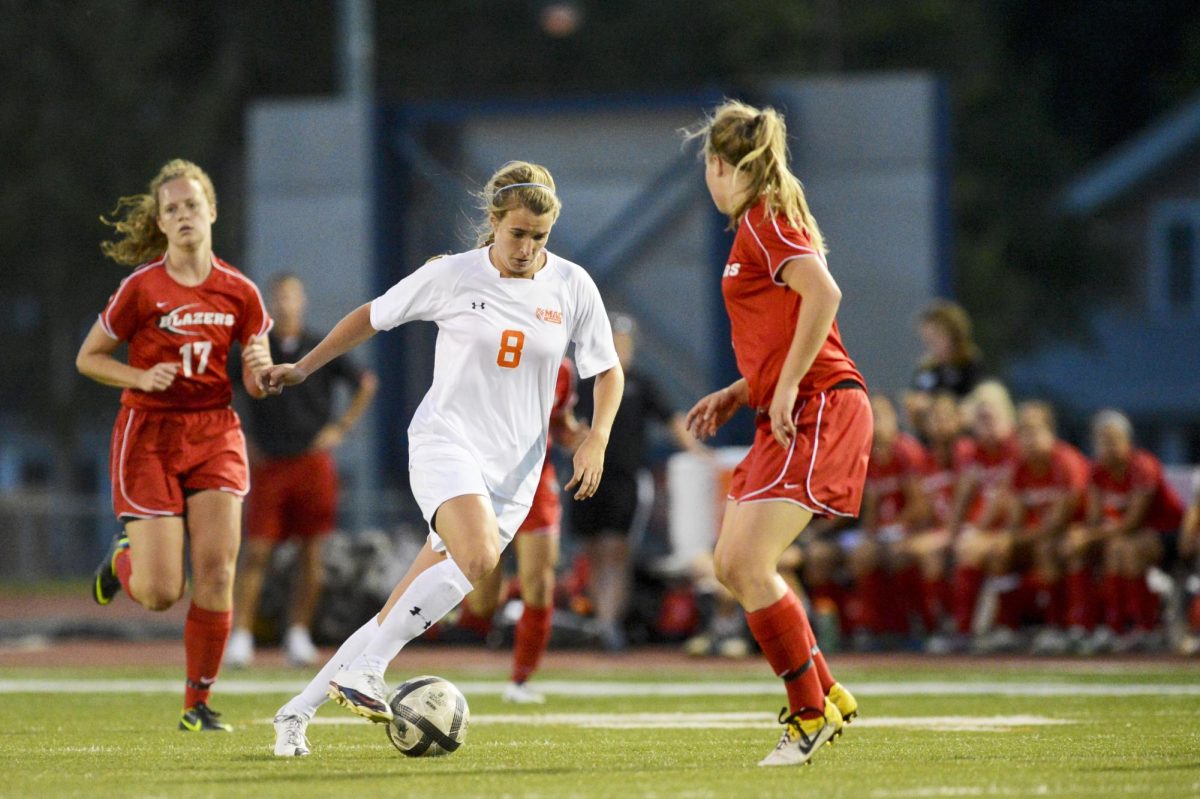






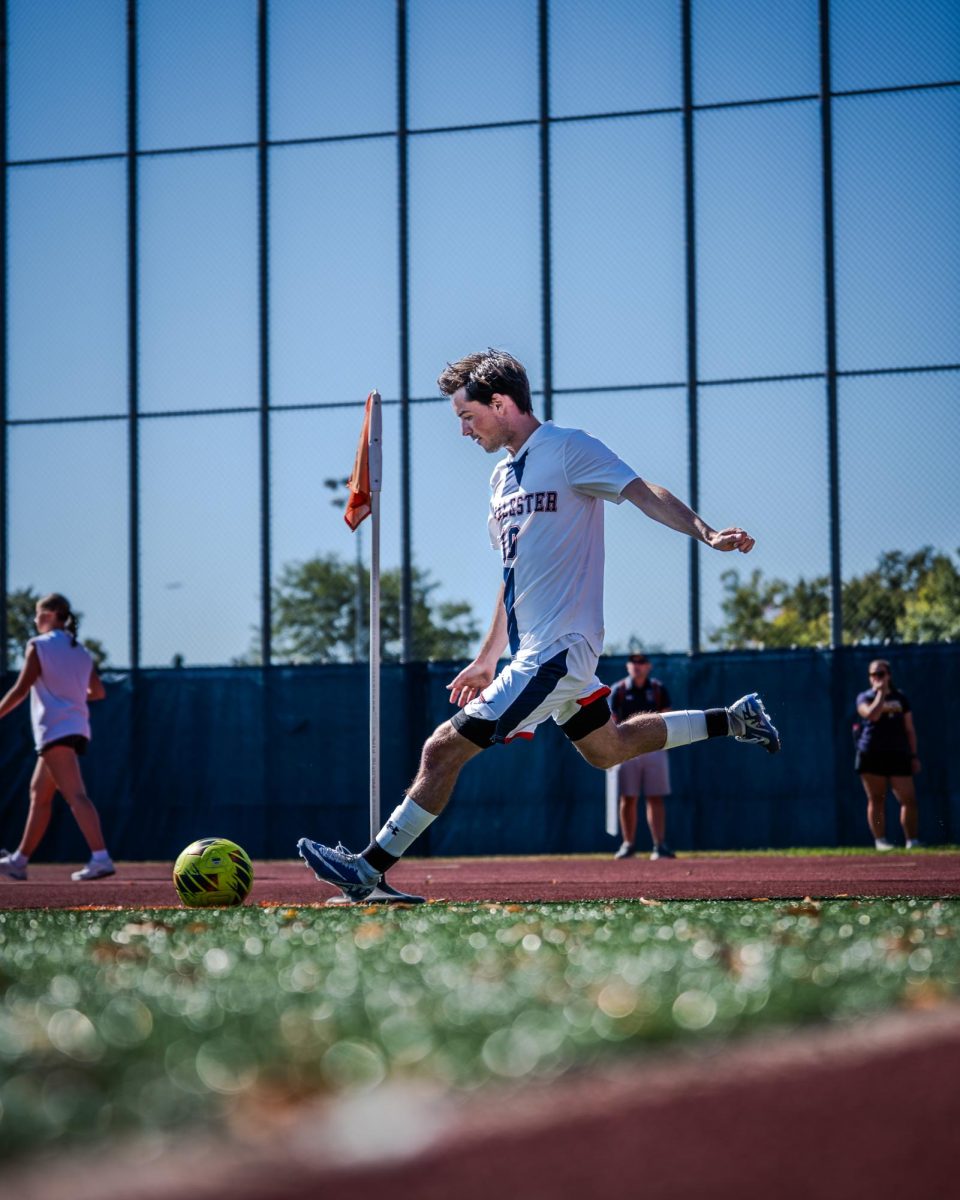
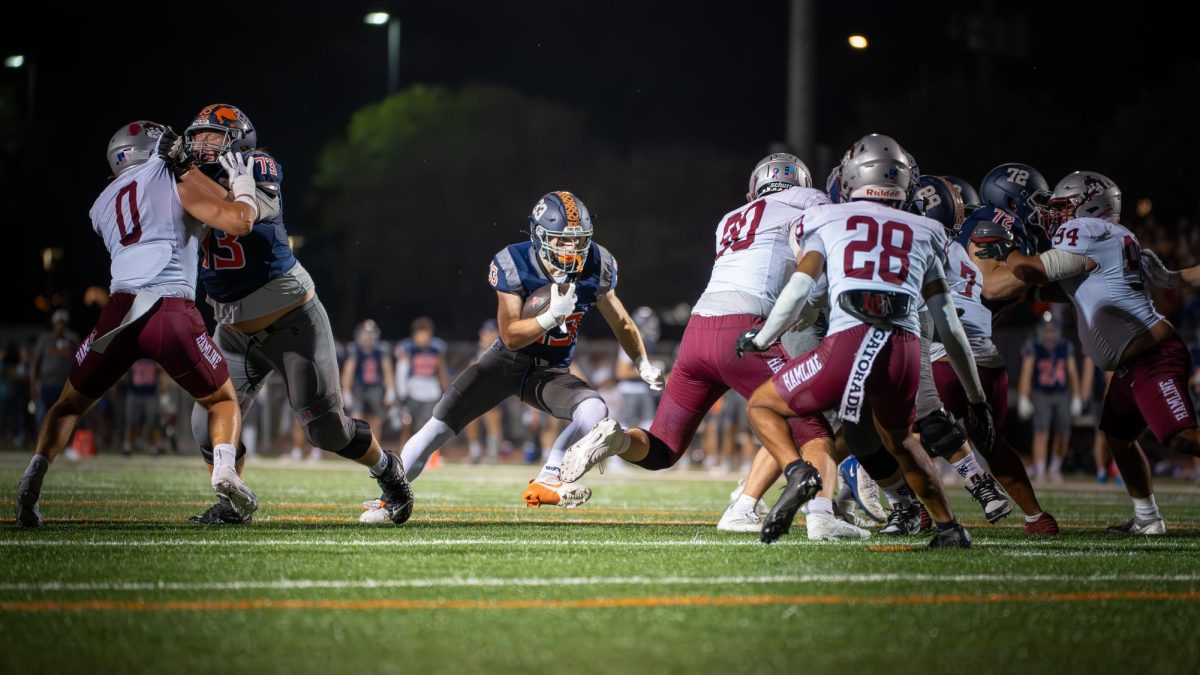



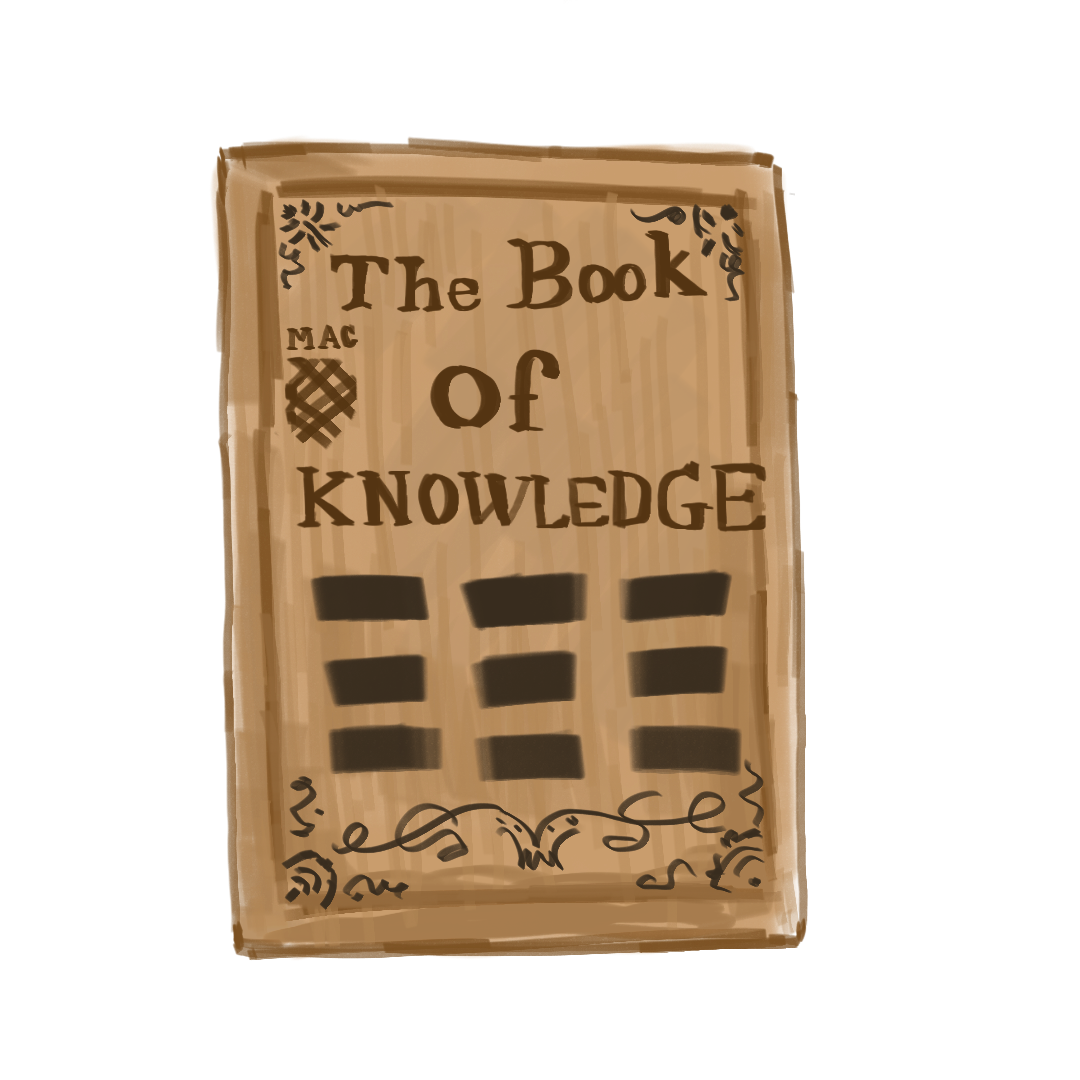

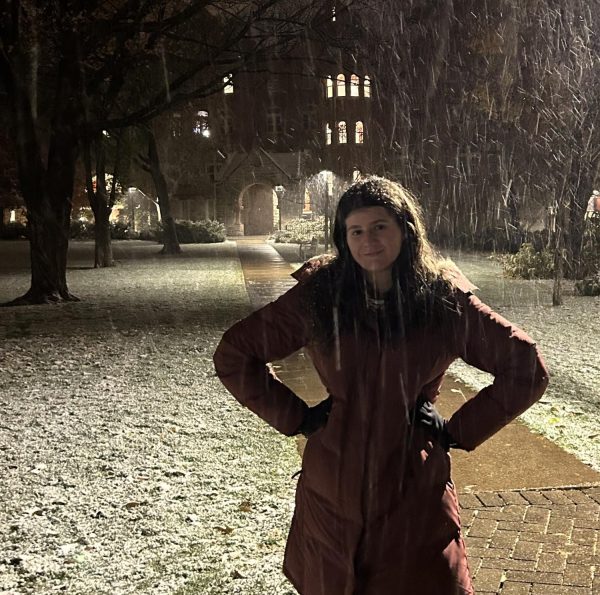
Jan Beebe • Nov 22, 2024 at 2:49 pm
Excellent piece – Georgia was a delight to have back on campus.